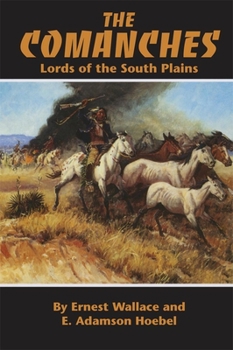The Comanches: Lords of the South Plains Volume 34
Select Format
Select Condition 
Book Overview
The fierce bands of Comanche Indians, on the testimony of their contemporaries, both red and white, numbered some of the most splendid horsemen the world has ever produced. Often the terror of other tribes, who, on finding a Comanche footprint in the Western plains country, would turn and go in the other direction, they were indeed the Lords of the South Plains. For more than a century and a half, since they had first moved into the Southwest from the north, the Comanches raided and pillaged and repelled all efforts to encroach on their hunting grounds. They decimated the pueblo of Pecos, within thirty miles of Santa F?. The Spanish frontier settlements of New Mexico were happy enough to let the raiding Comanches pass without hindrance to carry their terrorizing forays into Old Mexico, a thousand miles down to Durango. The Comanches fought the Texans, made off with their cattle, burned their homes, and effectively made their own lands unsafe for the white settlers. They fought and defeated at one time or another the Utes, Pawnees, Osages, Tonkawas, Apaches, and Navahos. These were "The People," the spartans of the prairies, the once mighty force of Comanches, a surprising number of whom survive today. More than twenty-five hundred live in the midst of an alien culture which as grown up around them. This book is the story of that tribe--the great traditions of the warfare, life, and institutions of another century that are today vivid memories among its elders. Despite their prolonged resistance, the Comanches, too, had to "come in." On a sultry summer day in June 1875, a small band of starving tribesmen straggled in to Fort Sill, near the Wichita Mountains in what is now the southwestern part of the state of Oklahoma. There they surrendered to the military authorities. So ended the reign of the Comanches on the southwestern frontier. Their horses had been captured and destroyed; the buffalo were gone; most of their tipis had been burned. They had held out to the end, but the time had now come for them to submit to the United States government demands.
Format:Paperback
Language:English
ISBN:0806120401
ISBN13:9780806120409
Release Date:September 1987
Publisher:University of Oklahoma Press
Length:416 Pages
Weight:1.05 lbs.
Dimensions:0.9" x 5.5" x 8.3"
Customer Reviews
1 rating
A classic Work on the Comanches
Published by Thriftbooks.com User , 23 years ago
The Comanches: Lords of the South Plains, by Ernest Wallace and E. Adamson Hoebel, is a comprehensive ethnological study of the Comanches. It assesses the minutia of their origins, social structure, government as well as a history of their communal existence. An underlying tension regarding this work is the credibility of late day informates as opposed to period records. At issue is the comprehensive interpretation suggested for Comanche government and law as opposed to the meager allowance given to Comanche cosmogony. Regarding government and law, after citing very limited source data from informants, the authors suggest an extensive system of government and law. Focusing on various aspects of the Comanche social experience, they drew parallels with modern day legal code. In the end, it seems, the authors imposed a system with nomenclature upon the Comanche social culture that did not in totality exist. On the other had they are adamant that the Comanches did not maintain extensive philosophical or theological thought. Yet, the evidence they present clearly suggests they did. Comanches commitment to the "guardian spirit complex", and the "Great Spirit" in every aspect of their lives evinced an unequivocal as well as pervading theology. Nineteenth century observers of the Comanches, Dodge, Neighbors, Babb, Burnett and others noted that the Comanches maintained deep theological notions. Nonetheless, Wallace and Hoebel are skeptical and suggest that later Christian writers forced their views upon Comanche theology because descriptions of Comanche cosmology, similar to certain Christian believes, were not supported by the evidence given by informants in the 1933 Santa Fe Laboratory group. It truth, informants said very little about theology or cosmogony. Clearly, data taken from the Santa Fe Laboratory study is given credence over recorded witnesses from the period. Despite the source issue, overall, this work is a superb study of the Comanches.





